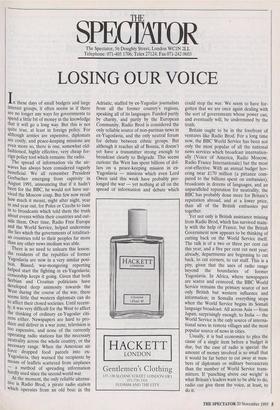SPECTAT THL OR The Spectator, 56 Doughty Street, London WC1N 2LL
Telephone: 071-405 1706; Telex 27124; Fax 071-242 0603
LOSING OUR VOICE
In these days of small budgets and large interest groups, it often seems as if there are no longer any ways for governments to spend a little bit of money in the knowledge that it will go a long way. But this is not quite true, at least in foreign policy. For although armies are expensive, diplomats are costly, and peace-keeping missions are even more so, there is one, somewhat old- fashioned, highly effective, very cheap for- eign policy tool which remains: the radio. The spread of information via the air- waves has always been considered vaguely beneficial. We all remember President Gorbachev emerging from captivity in August 1991, announcing that if it hadn't been for the BBC, he would not have sur- vived the Moscow coup. But few now recall how much it meant, night after night, year in and year out, for Poles or Czechs to tune in to broadcasts which told them the truth about events within their countries and out- side them. Over time, Radio Free Europe and the World Service, helped undermine the lies which the governments of totalitari- an countries told to their peoples far more than any other news medium was able. There is no need to unlearn this lesson: the residents of the republics of former Yugoslavia are now in a very similar posi- tion. Biased, war-mongering reporting helped start the fighting in ex-Yugoslavia; censorship keeps it going. Given that both Serbian and Croatian politicians have developed deep animosity towards the West during the course of the war, there seems little that western diplomats can do to affect their closed societies. Until recent- ly, it was very difficult for the West to affect the thinking of ordinary ex-Yugoslav citi- zens either. Newspapers are hard to pro- duce and deliver in a war zone, television is too expensive, and none of the currently operating radio stations has the necessary neutrality across the whole country, or the necessary range. When the American air force dropped food parcels into ex- Yugoslavia, they warned the recipients by means of leaflets scattered from airplanes — a method of spreading information hardly used since the second world war.
At the moment, the only reliable alterna- tive is Radio Brod, a pirate radio station which operates from an old boat in the Adriatic, staffed by ex-Yugoslav journalists from all the former country's regions, speaking all of its languages. Funded partly by charity, and partly by the European Community, Radio Brod is considered the only reliable source of non-partisan news in ex-Yugoslavia, and the only neutral forum for debate between ethnic groups. But although it reaches all of Bosnia, it doesn't yet have a transmitter strong enough to broadcast clearly to Belgrade. This seems curious: the West has spent billions of dol- lars on a peace-keeping mission in ex- Yugoslavia — missions which even Lord Owen said this week have probably pro- longed the war — yet nothing at all on the spread of information and debate which could stop the war. We seem to have for- gotten that we are once again dealing with the sort of governments whose power can, and eventually will, be undermined by the truth.
Britain ought to be in the forefront of ventures like Radio Brod. For a long time now, the BBC World Service has been not only the most popular of all the national news services which broadcast internation- ally (Voice of America, Radio Moscow, Radio France Internationale) but the most cost-effective. With an annual budget hov- ering near £170 million (a pittance com- pared to the billions spent on embassies), broadcasts in dozens of languages, and an unparalleled reputation for neutrality, the BBC has probably done more for Britain's reputation abroad, and at a lower price, than all of the British embassies put together.
Yet not only is British assistance missing from Radio Brod, which has survived main- ly with the help of France, but the British Government now appears to be thinking of cutting back on the World Service itself.
The talk is of a two or three per cent cut this year, and a five per cent cut next year; already, departments are beginning to cut back, to cut corners, to cut staff. This is a pity, given that the uses of radio range beyond the boundaries of former Yugoslavia. In Africa, where newspapers are scarce and censored, the BBC World Service remains the primary source of not only British but western influence and information; in Somalia everything stops when the World Service begins its Somali language broadcast. All across Asia — from Japan, surprisingly enough, to India — the World Service is the only source of interna- tional news in remote villages and the most popular source of news in cities.
Usually, it is bad economics to plea the cause of a single item before a budget is due, but the case of radio is special: the amount of money involved is so small that it would be far better to cut away at num- bers of diplomats or military bureaucrats than the number of World Service trans- mitters. If 'punching above our weight' is what Britain's leaders want to be able to do, radio can give them the voice, at least, to do it.










































































 Previous page
Previous page